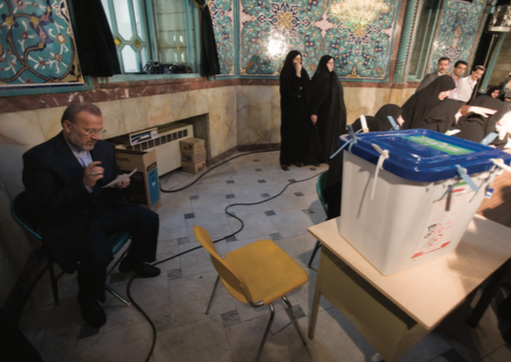The ‘third way’ is associated with both Tony Blair and Bill Clinton, but pitching for the middle ground is one of the oldest and most effective electoral strategies. Mir-Hossein Musavi, 67, is currently putting forward his own ‘third way’ to try and win Iran’s presidential election in June.
For both the British Labour Party and the US Democrats, the third way was a response to defeat. Likewise, Musavi has recognized the need for Iran’s reformists to adjust to a series of lost elections, including the 2005 presidential poll that brought hardliner Mahmoud Ahmadinejad to office.
Musavi is stressing the importance of both “principles” — the buzzword of the “principlists” or fundamentalists — and “reforms,” the buzzword of the reformists. And Musavi, although largely out of the public eye since being prime minister in the 1980s, has already disappointed those who relished the presidential election as a Manichean struggle between left and right.
These included both the radicals — at home and abroad — who wanted former reformist president Mohammed Khatami to stand again and the supporters of president Ahmadinejad.
Before Khatami pulled out in March, the Ahmadinejad camp was aiming to rally principlists by attacking the former president as a Trojan horse who would willingly or unwillingly undermine the Islamic Republic through a renewal of the student unrest that characterized his presidency of 1997-2005.
The prospect of such confrontation must have alarmed Ayatollah Ali Khamenei, the supreme leader, for whom elections should strengthen Iran rather than exacerbate internal differences. In a major speech in March, Ayatollah Khamenei explicitly rejected backing any particular presidential candidate, presumably to counter the notion he favors Ahmadinejad.
Compared to Khatami, Musavi is an almost reassuring candidate for regime loyalists. Known to older Iranians from his period as prime minister — a post that no longer exists — during the 1980-88 war with Iraq, he evokes a time of sacrifice and egalitarianism now remembered by some as a golden age.
Khatami’s candidacy would have been far more divisive. As Mohammad Atrianfar, former editor of the reformist Shargh newspaper put it, Khatami faced two options. He could either run for the presidency and face “heavy political attacks without achieving real changes,” or he could back Musavi, “who might implement fewer reforms but has more chance of being elected.”
While Musavi, like Khatami, wants social and political reforms, he is also concentrating on the day-to-day economic issues so often neglected by the reformists. Iran faces a fiscal crisis brought on by falling oil revenue, and dealing with it will require some tough decisions. Long overdue changes, especially the phasing out of universal subsidies of staple goods like bread, will require public understanding and acceptance.
While Ahmadinejad remains in poll position as an incumbent and a proven communicator with the mass electorate, he could be vulnerable to Musavi even on his chosen ground of “social justice.” But even with Khatami out of the race, Musavi will not carry the reformist banner alone. At 71, Mehdi Karrubi, the former parliamentary speaker, is unlikely to easily give up what will presumably be his last crack at the presidency.
At the end of the spectrum, the withdrawal of Khatami has made many conservatives more willing to speak out against Ahmadinejad, who has over his four years in office alienated many natural allies. The president has faced a bitter struggle in the conservative-controlled parliament, with his budget for the current year drastically amended.
Like Musavi, parliamentary deputies accuse Ahmadinejad of frittering away record oil revenue on ill-advised development projects around the country. Banks say the government policy of subsidizing loans has piled up record levels of bad debt and stoked inflation to its current level of 26 percent.
There has also been talk among conservatives about broadening the government after June’s election. The idea has been put forward by several heavyweights — including former President Akbar Hashemi Rafsanjani, Ali Akbar Nateq Nuri, an advisor to Ayatollah Ali Khamenei, and Mohsen Rezaie, the former commander of the Revolutionary Guards.
Many conservatives are not just concerned over Ahmadinejad’s domestic policies but are uneasy that his international radicalism — particularly in taunting the Israelis and in asserting Iran’s nuclear program — is not suited to delicate times.
Their calculation is that Ahmadinejad will likely continue as president after June, and they want him hemmed in. Hence, they would welcome a broader range of ministers in domestic portfolios. They would prefer that what they see as the president’s excitability does not complicate Iran’s diplomacy — even though Iran’s international approach will continue to be set by the leadership group, with Ayatollah Khamenei pre-eminent.
Hence an electoral challenge from another conservative — possibly Mohammed Bagher Ghalibaf, Tehran’s mayor — cannot be ruled out. But in any case, many conservatives would lose no sleep if Musavi polls well or even wins in June.
Gareth Smyth is the Financial Times Tehran correspondent

